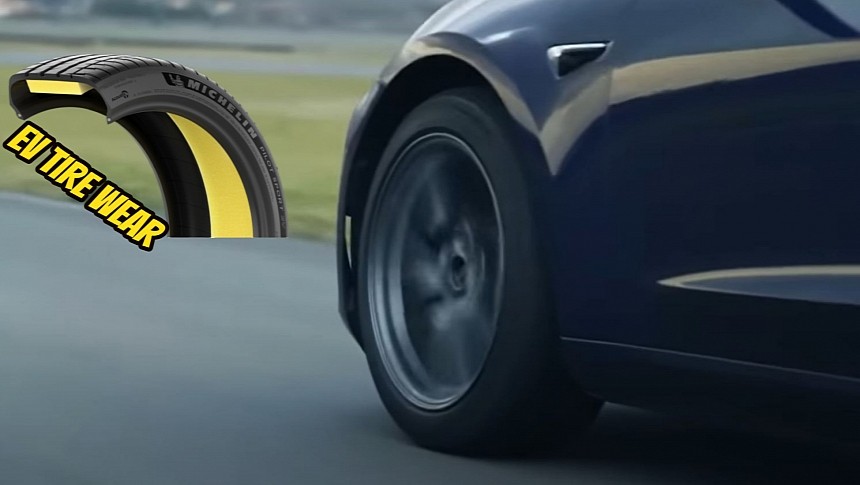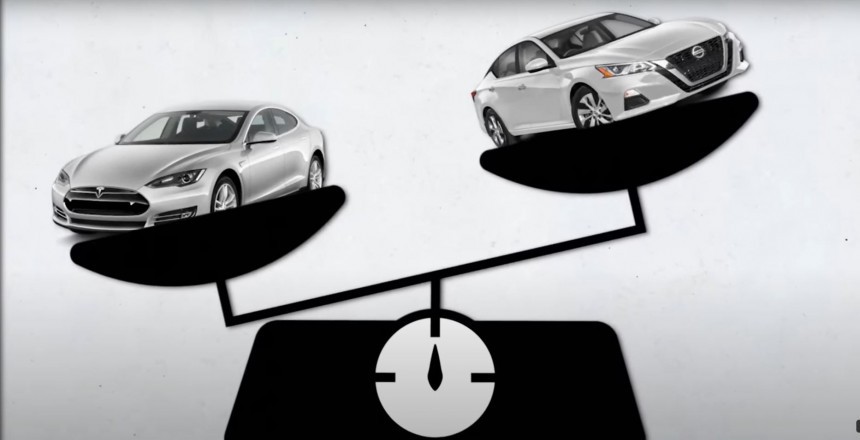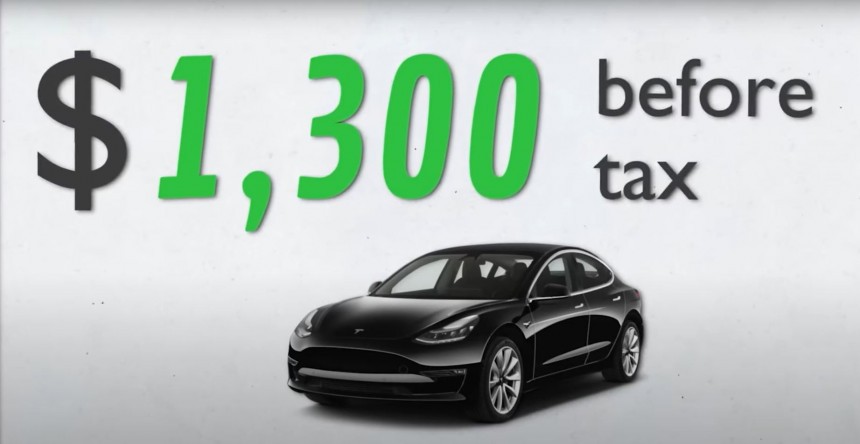Owning an EV as a commuting appliance can be rewarding if charging at home during off-peak hours is possible. It can significantly reduce the costs of "filling up" the battery with electrons. DC fast charging these days can be as expensive as getting gas. But another aspect that warrants your consideration is the EV's tires.
Were we to rewind one or two decades and try to remember the discussion surrounding electric vehicles (EVs) at the dawn of the third millennium, we would hear almost constantly that they are the ultimate solution to a climate catastrophe. But not many people used to pay attention before General Motors' EV1 and Tesla's Roadster came to market. Even after these two cars made headlines, Americans weren't too ecstatic about ditching their gas-powered cars and adopting a new lifestyle.
However, here we are now – in 2023, downsizing engines, electrifying powertrains, and looking at vehicles like the Ford F-150 Raptor R or the Cadillac Escalade V as exceptions are the name of the game. W16s, V12s, V10s, and V8s are slowly being phased out and replaced by electrified drivetrains with a V6 under the hood or, even worse, a four-pot.
But if you're not among those who believe there's no replacement for displacement, you might have given owning an EV some serious thought. For someone that needs a good car, it makes sense to consider something like the Tesla Model 3 or the soon-to-be-reborn Chevrolet Bolt, especially since there are so many incentives to go on the EV route.
While EVs have many advantages, such as potential lower maintenance costs, cheap home charging, instant torque, more cargo room than gas-powered counterparts, and being more silent, they also have some drawbacks.
In one of his latest videos, the man explains why EV buyers might have to deal with buying relatively expensive tires more often.
Kilmer argues that all-electric cars are heavier than their gas-powered counterparts and emphasizes that tires are the same size. Thus, if you're an EV owner, your car needs rubber rings with a higher weight rating, a characteristic that makes them wear out faster.
Another argument the mechanic presents is that EVs are zippy, and owners are willing to explore their capabilities. Frequent acceleration does impact tire life. Electric motors can deliver their torque almost instantaneously, making them feel a lot faster than some gas-powered equivalents.
If you haven't driven an EV, imagine hitting 4,000 rpm in your gas-powered car. But instead of waiting for the revs to build up, the response is absurdly quick. All that is thanks to the electrical current from the battery interacting with a magnetic field.
Once current is induced, the conductive elements of the motor interact with the magnets, and a turning force is applied. Since the magnetic field is constant, all it takes is an impulse (pressing the accelerator pedal), and total rotational force is readily available.
Had automakers not figured out a way to map the torque out at various motor rpms, we wouldn't be able to control an all-electric vehicle. The motors would spin the wheels so fast that no traction could be possible.
He doubles down and says that the Model 3 needs costly tires, usually required for luxury or high-end sports cars.
Looking at a popular online tire shop's offer for a set of Michelin Pilot Sport All Season 4 fitting a Tesla Model 3 Long Range (235/45/R18) with a 98Y load index and speed rating and XL load range, we can see a total price of $972 with installation included. After discounts and taxes, the final cost is $1,069, as you can see in the photo gallery.
However, the auto mechanic admits that EVs require pricier tires because they are tailor-made to suit zero-tailpipe emission propulsion systems. They must have low rolling resistance and be more silent without trading other safety requirements for these qualities. For example, tires must be able to support a heavier load while retaining all the other vital characteristics.
We would also add that tires tend to wear out faster because of the compound and tread material. However, nowadays some newer tires may have more than 30% higher wear resistance compared to most rubber rings found on internal combustion engine-powered vehicles. As EVs become better, so do the tires.
Ultimately, Scotty Kilmer advises prospective owners to estimate the "total lifetime cost of the tires" before making the switch.
However, here we are now – in 2023, downsizing engines, electrifying powertrains, and looking at vehicles like the Ford F-150 Raptor R or the Cadillac Escalade V as exceptions are the name of the game. W16s, V12s, V10s, and V8s are slowly being phased out and replaced by electrified drivetrains with a V6 under the hood or, even worse, a four-pot.
But if you're not among those who believe there's no replacement for displacement, you might have given owning an EV some serious thought. For someone that needs a good car, it makes sense to consider something like the Tesla Model 3 or the soon-to-be-reborn Chevrolet Bolt, especially since there are so many incentives to go on the EV route.
Costs you might not be aware of
Seasoned mechanic-turned-YouTuber Scotty Kilmer is known for disliking the latest stuff regarding cars, overcomplicated engineering, and turbocharged small engines. But he wants to keep up with the current times, so he's paying attention to what's happening in the automotive industry.In one of his latest videos, the man explains why EV buyers might have to deal with buying relatively expensive tires more often.
Kilmer argues that all-electric cars are heavier than their gas-powered counterparts and emphasizes that tires are the same size. Thus, if you're an EV owner, your car needs rubber rings with a higher weight rating, a characteristic that makes them wear out faster.
Another argument the mechanic presents is that EVs are zippy, and owners are willing to explore their capabilities. Frequent acceleration does impact tire life. Electric motors can deliver their torque almost instantaneously, making them feel a lot faster than some gas-powered equivalents.
Once current is induced, the conductive elements of the motor interact with the magnets, and a turning force is applied. Since the magnetic field is constant, all it takes is an impulse (pressing the accelerator pedal), and total rotational force is readily available.
Had automakers not figured out a way to map the torque out at various motor rpms, we wouldn't be able to control an all-electric vehicle. The motors would spin the wheels so fast that no traction could be possible.
It's not all bad
The mechanic also says that some EVs might require high-performance, expensive tires but underlines that rubber rings for all-electric vehicles are generally more expensive. He takes the popular Model 3 as an example and claims a set of tires could cost $1,300 before tax but with installation included.Looking at a popular online tire shop's offer for a set of Michelin Pilot Sport All Season 4 fitting a Tesla Model 3 Long Range (235/45/R18) with a 98Y load index and speed rating and XL load range, we can see a total price of $972 with installation included. After discounts and taxes, the final cost is $1,069, as you can see in the photo gallery.
However, the auto mechanic admits that EVs require pricier tires because they are tailor-made to suit zero-tailpipe emission propulsion systems. They must have low rolling resistance and be more silent without trading other safety requirements for these qualities. For example, tires must be able to support a heavier load while retaining all the other vital characteristics.
We would also add that tires tend to wear out faster because of the compound and tread material. However, nowadays some newer tires may have more than 30% higher wear resistance compared to most rubber rings found on internal combustion engine-powered vehicles. As EVs become better, so do the tires.
Ultimately, Scotty Kilmer advises prospective owners to estimate the "total lifetime cost of the tires" before making the switch.













